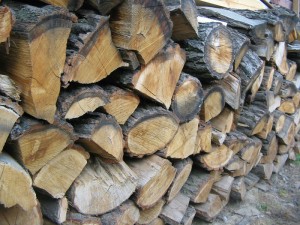The official beginning of winter is only a few days away, which means it is time to prepare for the upcoming chilly months. For those with fireplaces or other wood burning appliances, staying warm might involve lighting a toasty fire. Burning a high quality fire requires having the best fuel. Therefore, stocking up on the proper firewood can mean the difference between a great fire and a mediocre fire.
The most crucial aspect of firewood that you should take into consideration is how well the wood has been seasoned. Purchasing wood that has been seasoned indicates it has been stored indoors and allowed to dry out of the elements. How long the wood needs to season in order to dry properly depends on the variety of wood. Soft woods have low density, which means they can fully season in as little as six months. On the other hand, hard woods have high density, and they can take up to two years to dry out.
Ideally, you should invest in firewood that has had enough time to season before you burn it. Fully seasoned wood tends to cost more money because you can use it immediately with great results. You can also opt to purchase your wood ahead of time and allow it to season in a garage or shed. This option can save you money in the long run, but it requires planning. Burning unseasoned wood means burning wet wood, so a significant amount of energy from the fire goes toward boiling away the moisture instead of toward creating heat. For you, this adds up to less heat, a smoky fire, and burning more fuel than necessary.
Burning wet wood also results in incompletely burnt firewood. A product of this is creosote, a black and tarry vapor that clings to any surface once it cools enough. Consequently, the chimney becomes coated with creosote, which can eventually cut off the airflow in the chimney if it is allowed to build up. Creosote is also very flammable, so a wayward spark could send the chimney up in flames. Fortunately, this issue can be avoided by burning seasoned firewood and having annual chimney sweeps and inspections.
Another important factor to consider when choosing firewood is where the wood came from. Always ask the supplier what area the wood was taken from. Purchasing wood from distant areas could result in spreading nonnative species of insects or molds, which can wreak havoc on native species of trees that have no natural defenses against them. For this reason, avoid traveling further than a few counties away to purchase firewood, and do not agree to buy firewood that was cut down further than a few counties from the supplier. This effort helps prevent the destruction of native plant life.
For any further questions about how to purchase the best kind of firewood or to get in touch with a chimney expert, contact Ace Chimney Sweeps for a professional consultation.

